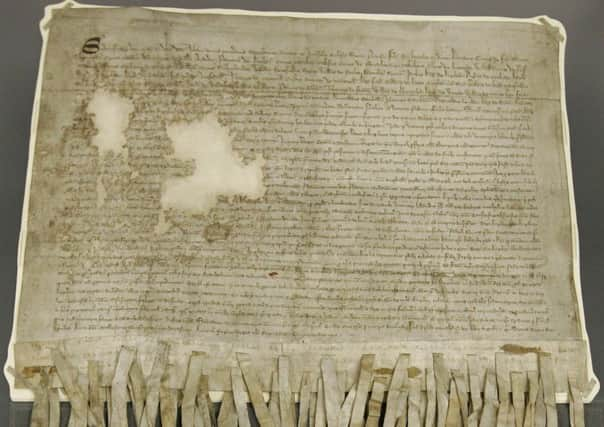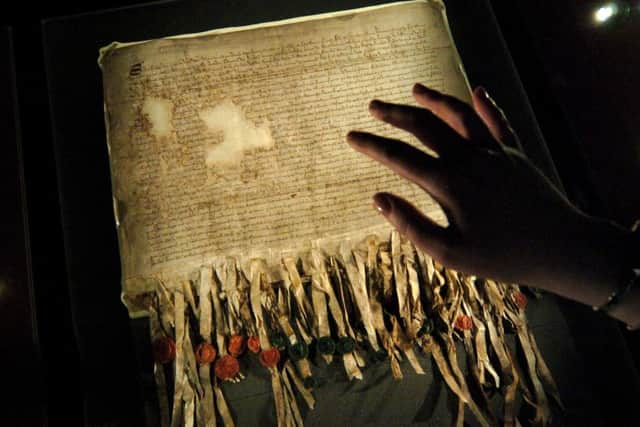Declaration of Arbroath awarded UNESCO '˜memory of the world' status
This article contains affiliate links. We may earn a small commission on items purchased through this article, but that does not affect our editorial judgement.


The “precious and fragile” document, drafted in 1320 and kept in the National Records of Scotland, has been included by UNESCO in its UK “Memory of the World” register.
The “Declaration” was a letter to the Pope, written in 1320 and signed by the Scottish barons pledging their resistance to English rule.
Advertisement
Hide AdAdvertisement
Hide AdSealed by 51 magnates and nobles and sent to Pope John XXII to assert Scotland’s status as an independent kingdom, it is recognised as the first declaration of contractual monarchy in Europe.


Its inclusion recognises its “outstanding significance to the UK”.
The document was displayed for the first time in 11 years, since it was exhibited at the Scottish Parliament in 2005.
Cabinet Secretary for Culture, Tourism and External Affairs Fiona Hyslop said: “Almost 700 years after the Declaration was drafted, it is fitting that it has been globally-recognised.


“This iconic document was so important when it was written and has inspired people for many generations and internationally.
“It is a clarion call for the expression of the sovereignty of the Scottish people to be recognised -- but this is not just a document for Scotland now; it is a document for the world.
“To have that recognition by Unesco Memory of the World gives it the recognition that it rightly deserves.”
Advertisement
Hide AdAdvertisement
Hide AdShe added: “It is so fragile and so precious and to see it has been a huge personal privilege.”
Tim Ellis, Keeper of the Records of Scotland, said: “The Declaration of Arbroath holds a unique place in Scotland’s history and tells a vital piece of our story, as its entry in UNESCO’s Register confirms.
“We’re proud to hold it in our collections at National Records of Scotland and to work to preserve it for future generations.”
Elizabeth Oxborrow-Cowan, Chair of UK Committee, UNESCO Memory of the World Programme, said: “I am delighted to welcome the Declaration of Arbroath onto the UK Memory of the World Register and I congratulate the National Records of Scotland on this achievement.
“This famous document rightly deserves the accolade of outstanding significance to the UK.
“It is one of the earliest articulations of Scottish nationhood and still a very important document in Scottish identity.
“The most remarkable thing is that this document has survived for nearly 700 years.”
Advertisement
Hide AdAdvertisement
Hide AdThe Declaration of Arbroath was drafted on April 6th, 1320 -- six years after Robert the Bruce’s historic victory against Edward II at Bannockburn -- as a plea to Pope John XXII to stop supporting the English and recognise Scotland’s independence.
It was most likely drafted in the scriptorium of Arbroath Abbey by Abbot Bernard on behalf of the nobles and barons of Scotland.
It states: “As long as but a hundred of us remain alive, never will we on any conditions be brought under English rule. It is in truth not for glory, nor riches, nor honours that we are fighting, but for freedom -- for that alone, which no honest man gives up but with life itself.”
Alan Borthwick, head of medieval and early modern records at the National Records of Scotland, said: “There is little doubt that this is the most important document we have. Most people in Scotland would agree it is ‘the’ iconic Scottish document.
“It encapsulates in the course of only around 800 words, the case for Scotland’s ancient sovereignty as well as imploring the assistance of the Pope in bringing an end to the long running dispute with England.
“It is a remarkable survivor.”
DOWNLOAD THE SCOTSMAN APP ON ITUNES OR GOOGLE PLAY
